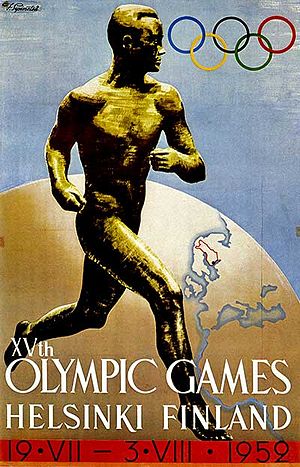
The 1952 Summer Olympic Games were held in Helsinki, Finland from July 19 to August 3, 1952. It's still the northernmost city to arrange Summer Olympic Games in history. During the Helsinki Games several world records were broken in sports and it was until 2008 Bejing Summer Olympics when more world records were made. The granting and the arrangement of the Helsinki Olympic Games weren't easy events, contrarily this process proved to be remarkably difficult and exceptional one and the Helsinki Games were postponed several times for multiple reasons. Referring to this, the picture above was originally a put-up for the 1940 Games, but which were canceled because of the Winter War and the II World War altogether. Still the poster was used in 1952, the date was changed and the Finnish borders were modifed to match the post II World War. The Soviet Union made its Olympic debut in Helsinki and Germany attended the Games first time after the II World War. One of the heroes of Helsinki was a Czechoslovak long-distance runner, Emil Zatopek.
The initiative and the motion to get the Olympic Games
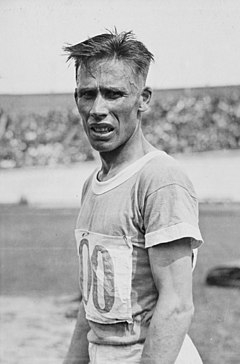
.jpg)
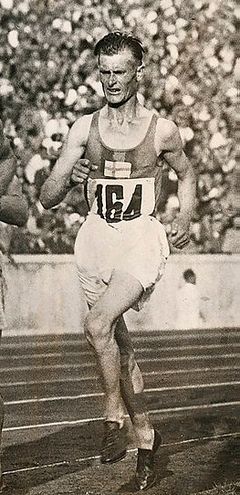
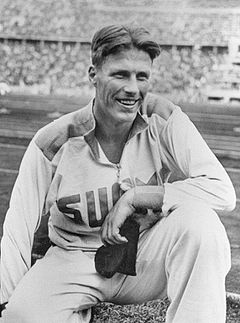
From Stockholm 1912 all the way to Berlin 1936, the times before the II World War, the international success of the Finnish athletes was enormous especially in track and field. Culminating in the 1924 Summer Olympic Games in Paris medal count and the medal table, Finland was in the 2nd place, just the US ahead. Finland was among "the Great Powers" in sports.
https://en.wikipedia.org/wiki/1924_Summer_Olympics_medal_table
The men in the pictures are successful Finnish long-distance runners in the 1920s and 1930s, from left, Ville Ritola(5 gold medals and 3 silver medals in Olympic Games), Paavo Nurmi(9 gold medals and 3 silver medals), Ilmari Salminen(inter alia the Berlin 1936 10 000m Olympic gold medalist) and Gunnar Höckert(Berlin 1936 5 000m Olympic gold medalist).
In very early in the 1920s, inspired by this success, the Finnish organizations and the bosses in sports launched a project to arrange Summer Olympic Games in Finland. The enthusiasm spread also among the Finnish citizens, only with 3 million of population this small and poor nation with the bitter and guts had played in sports its way among the other nations. The Finnish Olympic Foundation was established to run this project.
The Run for the Summer Olympic Games and the surprising option for the Host of 1940
I recommend watching the youtube link above. It's a shortie of building the Helsinki Olympic Stadium in the 1930s. The Finnish nation was really pushing forward for the Olympic project. Building the Olympic Stadium was just one structure in the vast construction scheme.
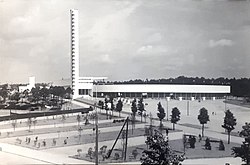
In 1930 Helsinki announced it was running for the 1936 Summer Olympics, accelerating the Helsinki Olympic Stadium construction(completed in 1938, picture above). However, Berlin was selected for the host, disappointed with the result Helsinki instantly announced its wish to run for the 1940 Summer Olympic Games. Helsinki was rejected again when Tokyo was this time selected.
The Finns had already abandoned their dream to host the Olympic Games, but a sudden turnup occured in this case in 1938. Because the war between the Empire of Japan and the Republic of China, Tokyo withdrew from hosting the 1940 Games. The International Olympic Comittee now supported Helsinki for the host. Although the time was running out for the preparations, Helsinki agreed.
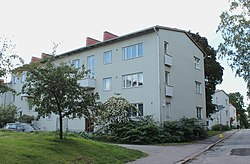
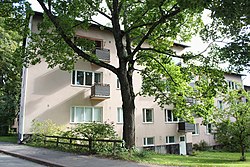
The forgotten construction projects were re-established, in Käpylä neighborhood residental areas for athletes were completed, these pictures above are a few of those buildings, now in civilian use photographed in modern day Helsinki.
During these preparations the Global tension was sharpened to its edge. The II World War broke out on September 1, 1939. In spite of this, the organizing committees carried out their work until the breakout of the Winter War on November 30, 1939. In April 1940, the Finnish Olympic Committee informed of the cancellation of the 1940 Summer Olympic Games. The Winter War had ended, but the II World War had spread.
Another rejection
After the II World War London was the first city to host the Summer Olympic Games in 1948. The affairs in the global politics were determining and a victorious Allied nation was rather selected for the host. So, Helsinki was rejected.
Helsinki 1952 and summary
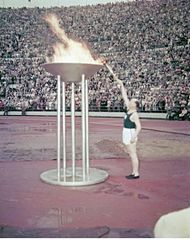
On July 19, 1952 Paavo Nurmi set the fire of the Olympic Flames in Helsinki Olympic Stadium. Helsinki was chosen for the host city at last in 1947. During the opening ceremony the weather was chilly and rainy but still the stadium was fully crowded with 70 000 of people. The success of the Finns wasn't like it used to be in the good old days, but the Games had a different, more important meaning and effect for the nation.
Defeated in the World War II and paying war-reparations Finland was able to held the Summer Olympics of 1952. Still nowadays this event is one of the most noticeable ever held in Finland. In the eyes of the Western Powers Finland had chosen the wrong side in the II World War and its reputation had suffered. By granting the Olympic Games for Finland the West "shook hands" with the Finns, respecting the success of the former athletes of the nation and respecting the promise of the already granted Summer Olympics of 1940 which never came. After the odyssey of the Continuation War, Finland was now again most welcome among the other nations.
In Finnish society the Summer Olympic Games of 1952 are seen as a kind of symbolic ending for the post-war years. The re-construction and re-building of the country was nearly completed in 1952 as well as living under rationing of daily supplies. Finland and Helsinki received positive international acceptance. The positive trend in development of Helsinki had started already in the 1930s and was now encouraged by the Olympic Games. The effects for the Finnish society by the Helsinki Olympic Games, it's hard to estimate, or say shortly. The event was a boost for the Finnish confidence and it was a new experience about the interaction between the nations. The first steps towards a welfare state was taken.
Last edited:

